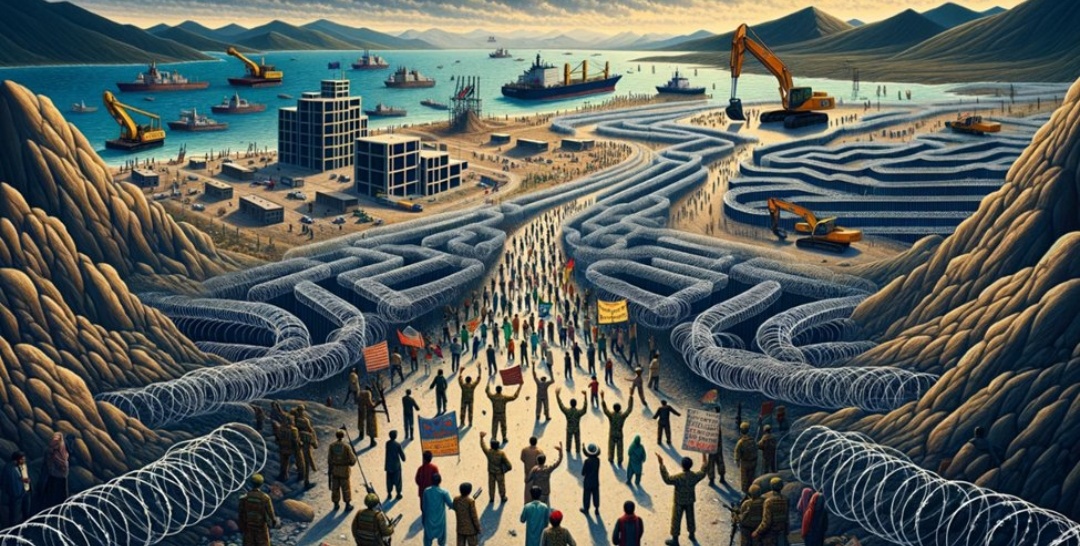A distinct footprint of large scale infrastructure projects in South Asia is their securitization at the expense of local communities. This pattern in more evident in troubled areas that are excluded from the mainstream developmental paradigm. In the name of development, we see the rise of economic zones where local populations are denied access due to the host state’s presumed threat perceptions. As a result, rather than opening avenues of peace and stability, these projects reinforce alienation.
The recent revival of barbed wire fencing around Gwadar has unleashed a storm of protest and outcry, amplifying the longstanding grievances of the Baloch people. Gwadar is home to over 300,000 people, of which many of them rely on fishing and small scale business activities for their livelihood.
Initially framed as a security measure, this project has deepened the sense of alienation felt by the indigenous people. The project to fence off Gwadar, which began in 2020 amidst protests, was temporarily suspended due to fierce opposition. However, recent developments indicate the revival of this divisive initiative, causing dismay among locals.
Often hailed as the “jewel of the China-Pakistan Economic Corridor (CPEC),” Gwadar has turned into a symbol of discontent. The multi-billion-dollar infrastructure projects, touted as beacons of progress, have instead amplified the voices of disenfranchisement among the indigenous people. Their growing sense of marginalization has been exacerbated by forced relocations and increasing restrictions on their movements, fundamentally transforming a once-thriving hub of cultural diversity and economic activity into a labyrinth of military checkpoints and fences.
These barricades, ostensibly erected for security purposes, embody a more disturbing reality: a strategy aimed at segregating and imprisoning the locals in their own homeland. The fencing restricts freedom of movement, creating an environment of intimidation and fear. At its core, the situation echoes colonial legacy, violating the fundamental human rights of Gwadar’s indigenous inhabitants. In 2021, the residents of Gwadar breathed a sigh of relief after the Balochistan High Court halted the plan to fortify the area but their happiness remained short-lived.
This encroachment is reminiscent of past atrocities committed under the guise of development and progress, highlighting an enduring legacy of oppression that continues to haunt marginalized communities. The ongoing security measures further isolate and alienate the local populace, exacerbating a climate already fraught with enforced disappearances, environmental degradation, and economic hardship. Recent floods have left scars yet to heal, adding to the region’s dire situation and perpetuating a pervasive sense of marginalization.
The encroachment on Gwadar violates the fundamental rights and dignity of the locals, betraying principles of justice and equality. It highlights an urgent need for a new approach to development, one that genuinely prioritizes the concerns of marginalized communities. Development should be grounded in respect for inherent rights and freedoms and built on inclusive dialogue.
It is crucial that the international community stands in solidarity with the Baloch people in their fight against oppression and injustice. In the last couple of years, Gwadar has got widespread attention due to the massive protest movements not only by the local civil society but even by the organizations that are long considered as informal extensions of the state power. This points to the fact that even the state-backed institutions that used to influence public narratives find it difficult to operate unless they voice local grievances.
The fencing of Gwadar warrants unequivocal condemnation, urging the Pakistani government to respect the rights and dignity of its indigenous population. The time for action is now, as Gwadar’s future hangs precariously between progress and oppression. Global pressure can make a difference, and it is through collective voices that we can ensure marginalized voices are heard, their rights defended, and a truly equitable future realized.

